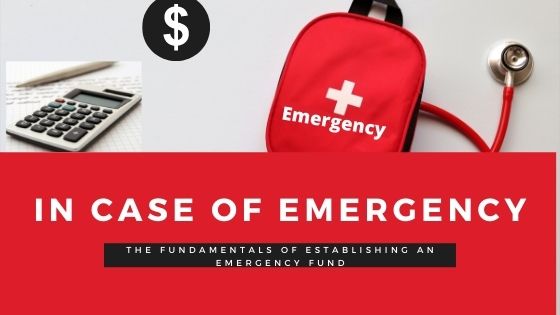In Case of Emergency
Nickels, do you have an emergency fund? This is a topic that is near and dear to my heart based on my own financial hardships and experiences. You may recall during our current VP’s run for the presidency in 2019 her mention of how most Americans were only a $500 emergency away from a complete financial catastrophe which is why this topic is so important. As a person who has studied Personal Financial Planning and has a degree in Finance I have observed that most people when discussing financial literacy or generational wealth glaze over how essential an emergency fund can be to a person’s overall financial wellness. I think most of us put the cart before the horse on this particular topic of financial planning. In class we were taught that a sufficient emergency fund is a top priority to establish with most clients before helping them assess their other financial goals because without this component their other financial goals such as retirement, insurance, and investing can be compromised.
So you may be wondering what a sufficient emergency fund is, right? Well that may vary from person to person as the rules may be applied differently based on a person’s financial well being. For example an extremely wealthy person like Elon Musk is less likely to have or need an emergency fund solely based on the characteristics of an emergency fund which are savings placed in cash or cash equivalents; not many wealthy people or savvy investors will tie up their assets in such low interest generating accounts. However, the average American needs such a fund and without curating a custom analysis on an individual which would include preparing a statement of financial positions to determine a person’s net worth and a cash flow statement to understand a person’s spending habits and non-discretionary expenses, the general answer to the above question is 3 to 6 months of expenses should be saved in an emergency fund. Below is a FAQ with things to consider when establishing an emergency fund.
When is it appropriate to save 3 months of expenses vs 6 months of expenses? 3 months may be considered when the following applies:
- A single wage earner who is gainfully employed with a sizable second income such as rental income, alimony income, or trust beneficiary income
- Married but only one spouse is gainfully employed with a sizable second income
- Married and both spouses are gainfully employed.
If the above does not apply then a person or couple should save up to 6 months of expenses. Also, please note gainfully employed may be subjective so consider if the person or couple consistently works full-time hours with a guaranteed salary.
What type of accounts should be used for an emergency fund? An emergency fund should be a liquid asset that can be easily accessed with little to no penalty or fluctuation in principal such as:
- Checking accounts
- Saving accounts
- Money Market (MM) deposit accounts or MM mutual funds
Can a person use their retirement account assets for an emergency fund?
The short answer is possibly but as a retirement expert I do not recommend the use of retirement assets for a person’s first recourse. In review of a prospective client’s portfolio it is prudent a planner review all aspects of a client’s financial situation which may include the review of materials like a person’s Summary Plan Description (SPD) of their employer sponsored retirement plan. The SPD may be used to confirm if there are alternative solutions in case of an emergency like a hardship distribution provision. If a plan has a hardship provision they must follow the IRS guidelines which allow a person to withdrawal assets from their retirement account due to immediate and heavy financial need like to pay for medical expenses, the purchase of a primary residence, tuition, payment to avoid eviction or foreclosure, funeral expenses, and to pay for the damage of primary residence. Using retirement assets in an emergency should be a last resort. Retirement withdrawals prior to age 59.5 may be subject to a 10% early withdrawal penalty, require one to stop deductions for 6 months which impacts retirement asset growth, and the loss of future retirement income. Another retirement plan provision to consider as an option if available in case of an emergency are retirement plan loans. Loans are an administrative nightmare for employers but a feasible option for an employee to prevent a financial catastrophe in the event an emergency fund is not established. The benefit to borrowing from retirement income vs making a withdrawal is that the money will be tax and penalty free provided it is paid back with interest and it will not have a long term impact to the principal.
What expenses should be considered when calculating the emergency fund reserve? Only non-discretionary expenses should be used in this calculation such as:
- Mortgage or rent payment
- Utilities
- Taxes
- Car note
- Insurance
- A modest food and clothing allowance
- Child care
Nonemergency expenses such as streaming subscriptions, cable, gift allowances, dining out, etc should not be factored into the calculation. However, a person may add one additional month of expenses to the emergency fund to cover reoccurring discretionary expenses each month.
In closing, we are encouraged to wear seatbelts to prevent a catastrophe in a car accident. We are required to buy homeowner’s insurance to protect our investment in the event our home is damaged or burglarized. Therefore, an emergency fund is no different than any other preventative mechanism used to mitigate risk and protect ourselves. If you have financial goals but do not have an emergency fund then you are doing something wrong. You are jeopardizing your financial well being. So let’s make establishing an emergency fund a top priority in 2022!

